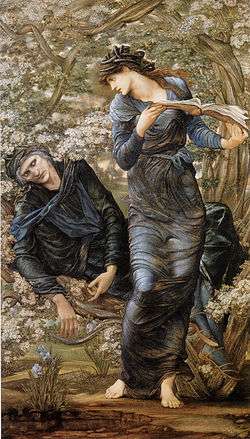The Beguiling of Merlin
The Beguiling of Merlin is a painting by the British Pre-Raphaelite painter Edward Burne-Jones that was created between 1872 and 1877.
| The Beguiling of Merlin | |
|---|---|
 | |
| Artist | Edward Burne-Jones |
| Year | 1872–1877 |
| Medium | Oil on canvas |
| Dimensions | 186 cm × 111 cm (73 in × 44 in) |
| Location | Lady Lever Art Gallery, Port Sunlight, Merseyside |
The painting depicts a scene from the Arthurian legend about the infatuation of Merlin with the Lady of the Lake, Nimue. Merlin is shown trapped, helpless in a hawthorn bush as Nimue reads from a book of spells.[1]
The work was commissioned from Burne-Jones by Frederick Richards Leyland, a Liverpool ship-owner and art-collector,[2] in the late 1860s. After a false start blamed on "poor materials", Burne-Jones began work on the painting proper in 1873, finishing the body of the work by the end of 1874; however, the painting was not first exhibited until 1877 at the opening exhibition of the Grosvenor Gallery in London.[1]
Burne-Jones used Maria Zambaco, who was probably his mistress from 1866 to 1872, for the model for the head of Nimue.[1]
The Beguiling of Merlin was purchased by Lord Leverhulme in 1918 and remains in the Lady Lever Art Gallery to the present day.[1]
The painting features on the covers of the books Possession: A Romance (1990), by A. S. Byatt, and Fiona MacCarthy's biography of Burne-Jones, The Last Pre-Raphaelite (2011).[3] The painting also plays a significant role in the 1991 novel King Solomon's Carpet by Ruth Rendell writing as Barbara Vine.
References
- Artwork of the Month - January 2003 - The Beguiling of Merlin, by Edward Coley Burne-Jones (1833 – 1898) at Liverpoolmuseums.org.uk.
- Frederick Richards Leyland, 1832-1892 Archived 2007-11-03 at the Wayback Machine at the Center for Whistler Studies.
- Hill, Rosemary (25 August 2011). "The Last Pre-Raphaelite by Fiona MacCarthy". The Guardian. Retrieved 1 October 2011.
Further reading
- Wildman, S (1998). Edward Burne-Jones, Victorian artist-dreamer. New York: The Metropolitan Museum of Art.